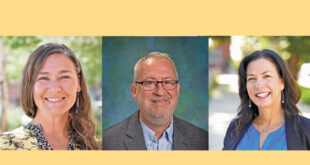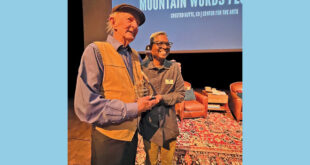By Mark Reaman
The synchronicity of Created Equal, written in Skyland and filmed in New Orleans
Sitting in Crested Butte’s Wooden Nickel on a warm summer evening, Roger Brown sort of looks like a movie producer. Sporting a casual golf shirt, nursing a cocktail and a smile, the silver-haired former lawyer and oil company executive leans back and shares stories about actors, agents and producers.
And Brown is actually a movie producer, with his first film, Created Equal, pulling in accolades at film festivals and getting ready for a general release in the fall at some theaters and on Amazon and Netflix. But this job is a relatively new endeavor for Brown, who spends much of his time in the valley. The movie is based on a book he wrote four summers ago in Crested Butte between rounds of golf at Skyland.
What began as a regular Friday morning discussion group of Crested Butte Catholic men turned into a movie starring Lou Diamond Phillips and directed by Bill Duke. Crested Butte will have a chance to view a preview of the film Saturday, July 8 at the Crested Butte Center for the Arts.
Six summers ago, the Skyland resident took a question that came out of the men’s discussion group and turned it into a book perhaps best described as a legal thriller.
The question was “Why couldn’t a woman be a priest?” As Brown researched the question he found no solid legal reason they couldn’t. His lawyer’s mind looked at the different angles and he penned a book centered on a woman who pushes the question through a lawsuit filed against the archdiocese of Galveston-Houston.
“I had a routine going where I would go golf in the morning and come back to the house where I would sit on the deck, light a good cigar, pour a Scotch and dictate my ideas for the book. I used speech recognition software, which immediately translated that to print on my laptop,” he explained. “It took 90 days for 50 chapters and 236 pages.”
In the book, Aleksandra Kowalski turns to successful attorney Thomas Patrick O’Reilly to pursue the case. In the movie, the heroine is Alejandra Batista, who is Hispanic instead of Polish, and the lawsuit takes place in New Orleans with an up-and-coming lawyer instead of in Houston.
A wild ride for Brown
As so often can happen in life, synchronicity came into play on this new adventure. Brown, who ended his professional career in the oil business, ran into someone who suggested he go to the Sundance Film Festival to pitch the idea of making his book into a movie. He did that four years ago and found there was indeed interest in his book, based on the plot. But he was told he would need a screenplay instead of a book to interest producers.
To turn a book into a film, the standard is to expect each page of the book will take a minute of film time. And 236-minute films don’t do well. So at the suggestion of the producer from Sundance, he began the arduous process of turning the book into a legitimate screenplay. The screenplay was submitted to agents who liked the concept but insisted on several different rewrites. It went through about a half dozen revisions.
At one point, Brown said he was offered $600,000 for the rights to the screenplay by a professional producer but was told he would lose control of the screenplay. “That’s a lot of money to me,” he said. “But I had started putting together a partnership group to finance a film based on the positive feedback I had received from the book and the idea of the film. We raised more than a million dollars, many of them with Crested Butte connections, so I turned that offer down. It has been a wild ride since then.”
Brown went through several versions of the screenplay to get to the point that professionals in the industry would act to help get the movie made. Screenwriters in New York and Los Angeles tackled the project.
“Everyone loved the idea and saw the potential,” he said. “But they all insisted on different versions. They wanted a backstory or they wanted more action. I had written the book with the lead character being Polish like my grandmother but we decided that an Hispanic woman would be better for the movie. New Orleans offers tax incentives for films so we changed the location from Houston to New Orleans.”
Finding the pros
Another example of synchronicity came when a nurse at his doctor’s office asked about the film. She said a friend of hers had been a movie producer and could possibly help him. Brown connected with Thada Catalon, who after serving as a sergeant in Iraqi Freedom became an accomplished actress and producer in the movie industry and who took on the project.
She sent the screenplay to various agencies, and well-known director Bill Duke liked the idea so much he signed on. His involvement helped attract quality actors. Many of them were Catholic as well and the idea of the story intrigued them. The casting director suggested to Catalon and Duke that Gregory Alan Williams would be a great fit for the role of the judge and the Emmy-award winner signed up. The lawyer suing the archdiocese of New Orleans is played by Aaron Tveit. Edy Ganem plays Alejandra Batista, who sues to become a priest.
“The casting people went through dozens of actresses for the role of Alejandra,” explained Brown. “Edy was so powerful she had everyone touched during her audition. Lou Diamond Phillips was pitched for the role of Monsignor Renzulli, who defends the church, and he accepted the role.
“He is so nice and a great actor,” Brown continued. “All the actors are so nice and they are great in the film. The movie business is really fun. A few of the leads involved in this did it because they were Catholic and were intrigued by the issue.”
The film was shot last September in New Orleans in part because of tax breaks. “We rented a courtroom after it was done for the day,” said Brown. “We rented an office on the weekends. The logistics of how it came together are interesting on their own. The film speaks to so many people. As a faith-based film, it is attracting not just Catholics but people of all denominations for the questions it raises about the faith. The acting is great and the story on film is a really fun legal drama.“
Getting kudos
Brown said there have of course been hiccups in the year-long film production process. Being the executive producer on a film is not cheap or easy. He had to step in and make hard decision between the director and producer. But in the end, the film, he says, is great and one that is already accumulating awards. It took two trophies at the Sunscreen Film Festival in St. Petersburg including best director and best actor. It was an official selection at the American Black Film Festival in Miami this June.
“You know, at these film festivals people can stay for Q&A sessions and at both of these events people didn’t leave,” Brown marveled. “They stayed to talk about the film and the issue. It’s gotten great reviews and there is a buzz being generated. It is sort of wild.”
The film will be promoted at other film festivals and Brown is working on getting the film into theaters and streamed at places like Netflix and through Amazon.
But Crested Butte people will get an early screening at the Crested Butte Center for the Arts on Saturday, July 8. A VIP screening will be held at 1 p.m. A general admission show will be held at 3 p.m. View the trailer and find out more about the film at www.createdequalmovie.com.
 The Crested Butte News Serving the Gunnison Valley since 1999
The Crested Butte News Serving the Gunnison Valley since 1999




